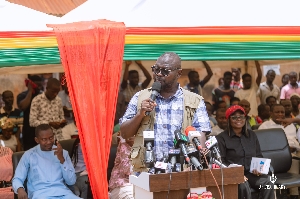General News of Friday, 2 November 2018
Source: starrfmonline.com
‘Corrupt’ politicians afraid to pass RTI bill - NCCE officer
The Eastern Regional Programs Officer of the National Commission on Civic Education (NCCE) George Konlan has chastised Members of Parliament for delaying the passage of the Right to Information bill.
According to him, their actions deepens suspicions of them being corrupt.
Speaking to Starr news on the sidelines of a roundtable discussions on “the Youth in the Fight Against Corruption in Ghana” held in Koforidua by the National Youth Authority to mark African Youth Day under the theme “Raising Youth Voices against Corruption”, George Konlan said RTI is the panacea reducing corruption to the minimum level hence must be passed at all cost.
“….That is one of the reasons why it has not yet been passed because the political office holders think that it might pose a threat to them that they may have to disclose documents they may not like to disclose. Very recently, I heard our parliamentarians say it is likely that they can’t pass it before parliament rises; why they are reluctant to pass it, they alone know. We can only speculate but they alone know. They do not know that they are confirming suspicions that they are not absorbed from practices that will expose them to public ridicule.”
According to him, “the Right to Information Bill will help to fight corruption. It will enable people to get the evidence they need to properly report corruption because we encourage people to report corruption but if you report corruption and you do not have any iota of evidence it becomes complicated because, evidence of corruption is difficult to secure and so the RTI will make it legally possible for people to go to into any institution and demand certain documents. If they refuse to give you, you can proceed to court to compel them to release the documents to you.”
The RTI is a fundamental human right guaranteed by Ghana’s 1992 Constitution and ratified as a right under International Conventions on Human rights.
The RTI bill was drafted in 1999 and reviewed in 2003, 2005 and 2007 but was not presented to Parliament.
The bill was presented to Parliament on February 5, 2010 but has since not been passed despite undergoing countless number of amendments. The delay in the passage of the bill has attracted many groups in recent times including the Media coalition on RTI to exert torrid pressure on Parliament to pass the bill before it rises.
According to George Konlan, the Eastern regional Programs Officer of NCCE, the Commission is not happy about delay in the passage of the RTI bill because it would complement the whistleblower act to expose corrupt practices.
“We are not happy at all because we want people to enjoy their freedoms and liberties, we want people to know so if you want to know you should have the opportunity to know”.













